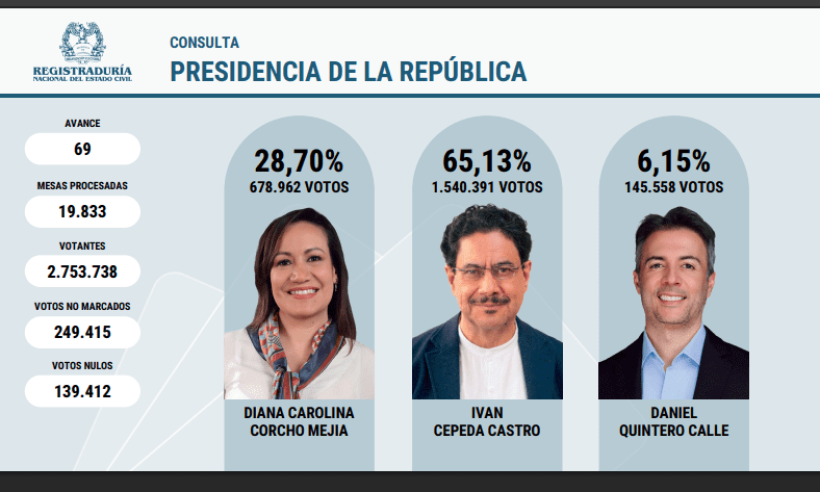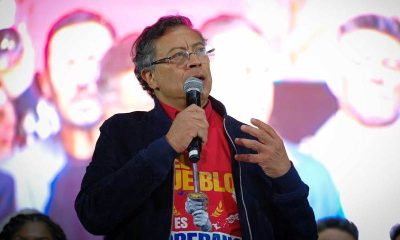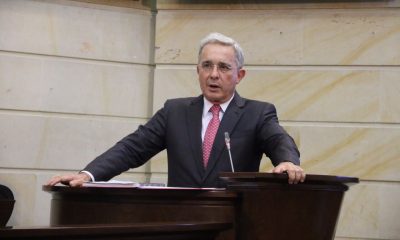Colombian Primary Election Picks Iván Cepeda as Presidential Candidate For Gustavo Petro’s Party Amid Record-Low Turnout & Legal Issues
The Pacto Histórico political coalition’s primary election, held on Sunday, resulted in a definitive victory for Senator Iván Cepeda Castro, securing his position as the coalition’s candidate for the upcoming presidential elections. The election, however, drew a total of 2,739,368 votes, highlighting a significant challenge for the ruling alliance as it contends with substantially diminished voter engagement compared to previous national polls.
With 99.04% of tables scrutinized by the Registraduría Nacional del Estado Civil, Senator Cepeda earned 1,533,284 votes, representing 65.13% of the valid total. He defeated psychiatrist and former Minister of Health Carolina Corcho, who garnered 676,110 votes (28.72%), and former Mayor of Medellín, Daniel Quintero, under criminal indictment, who received 144,677 votes (6.14%). Excluding the 385,297 non-marked and null votes, the effective participation stood at approximately 2.35 million valid votes.
Despite Iván Cepeda’s strong showing in the primary, weak turnout may indicate that Colombians are tired of Gustavo Petro’s populist antics and “revolutionary” politics.
The low turnout figure—totaling about 2.7 million, represents a loss of roughly 51% of the coalition’s support when compared to the 5.8 million votes it achieved during the 2022 presidential race.
The voter turnout was considerably less than the 13 million votes cast in the 2016 peace plebiscite—an election that President Gustavo Petro often referenced in his later calls for a failed constituent assembly initiative. The reduced participation, despite this being an open primary election available to any registered voter, underscores a notable decline in voter interest for the coalition’s internal process.
Implications for Daniel Quintero’s Political Future
Despite withdrawing late from the contest, embattled former Medellín Mayor Daniel Quintero’s name remained on the ballot, and his participation could carry legal ramifications for his political career.
Quintero’s late withdrawal is cited as a potential cause for his ineligibility as a candidate in the 2026 elections. According to Colombian electoral law, candidates must resign or step down from posts or public contests by specific deadlines to avoid disqualification from future elections. Once a person is formally inscribed as a pre-candidate in a consultation—even if they later renounce the candidacy—the legal action of participation may remain binding. His low vote count in the primary (6.14%) is unlikely to salvage his political momentum given the potential for a formal declaration of ineligibility.
Scrutiny Over Government Promotion
The election was further complicated by controversy regarding the fine line between promoting democratic participation and engaging in partisan political activity. Public officials were observed issuing messages to encourage voting, which has drawn the attention of control entities.
The Procuraduría General de la Nación is reviewing institutional publications that were disseminated during the voting period. This scrutiny is based on the Colombian Constitution’s Article 127, which prohibits public employees from intervening in partisan politics, except in cases specifically permitted by law, and from using state resources or their official positions to promote partisan causes or candidates.
While the government asserted that its role was confined to strengthening mechanisms of participation—a mission also advanced by the Defensoría del Pueblo—the convergence of an official, state-funded day of democratic promotion with an exclusive consultation by the ruling political movement raises legal questions. The disciplinary review will seek to determine if the government’s messages constituted a general call for participation or an act intended to favor a specific political collective. President Gustavo Petro’s Ministerio del Interior Armando Benedetti has defended the government’s position that institutional engagement was non-partisan.


























